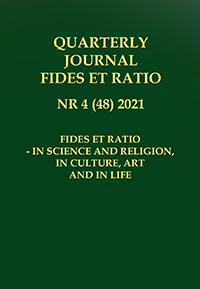Abstract
The main purpose of the presented article is to determine the expected and implemented skills, knowledge and attitudes of mentors, in the opinion of education students and in the light of Stefan Kunowski's theory of integral development.
The first part provides a brief overview of the ways mentoring itself is understood. The second part is a theoretical analysis of the mentor's influence in the perspective of the theory of integral development of the Polish educator Stefan Kunowski. The third part presents data obtained as a result of the conducted empirical research. The article ends with main research conclusions.
References
Achinstein, B, Fogo, B. (2015). Mentoring novices’ teaching of historical reasoning: Opportunities for pedagogical content knowledge development through mentor- facilitated practice, Teaching and Teacher Education, 45, 45–58, https://doi.org/10.1016/j.tate.2014.09.002.
Baran, M. (2017). ‘The Importance of Mentoring in Employee Work Engagement–Based on Research of Company Employees in Poland’, International Journal of Contemporary Management, 16(2), 33–56, https://doi.org/10.4467/24498939IJCM.17.009.7522.
Boreen, J., Johnson, M.K., Niday, D., Potts, J. (2009). Mentoring Beginning Teachers: Guiding, Reflecting, Coaching, Portland, ME: Stenhouse Publishers.
Bressman, S., Winter S.J., Efron, E.S. (2019). Next generation mentoring: Supporting teachers beyond induction, Teaching and Teacher Education Volume 73, July 2018, 162-170. https://doi.org/10.1016/j.tate.2018.04.003.
Browne, J. (2021), ‘Excuse the cat…’ Reflections on online mentoring during the COVID-19 pandemic. Med Educ, 55, 673-675, https://doi.org/10.1111/medu.14445.
Carter, M., & Francis, R. (2001). Mentoring and Beginning Teachers’ Workplace Learning. Asia-Pacific Journal of Teacher Education, 29(3), 249–262.
Chałas K. (2020). Inteligencja moralna jako czynnik warunkujący integralny rozwój młodego człowieka, (w): T. Przesławski (red.), Księga jubileuszowa z okazji 80-lecia urodzin dr hab. Krystyny Ostrowskiej, Warszawa: Wyd. Instytutu Sprawiedliwości.
Chałas, K. (2016). Introcepcja wartości, (w:) K. Chałas, A. Maj (red.), Encyklopedia Aksjologii Pedagogicznej, 460, Radom: Wyd. Polwen.
Davis, B., & Higdon, K. (2008). The Effects of Mentoring/Induction Support on Beginning Teachers’ Practices in Early Elementary Classrooms (K-3), Journal of Research in Childhood Education, 22(3), 261–274, https://doi.org/10.1080/02568540809594626.
Domagała- Zyśk E. (2018). Integral Development of Students with Special Educational Needs in Inclusive Education from a Personalistic Perspective, Paedagogia Christiana, 2(42), 181-193, http://dx.doi.org/10.12775/PCh.2018.023.
Dorner, H., Kárpáti, A. (2010).Mentoring for Innovation: Key Factors Affecting Participant Satisfaction in the Process of Collaborative Knowledge Construction in Teacher Training, Journal of asynchronous learning networks JALN, 14 (4), 63.
Frankl, V.E. (1966). Logotherapy and Existential Analysis—A Review, American Journal of Psychotherapy, 20(2), 252–260.
Frankl, V.E. (1966). Self-Transcendence as a Human Phenomenon, Journal of Humanistic Psychology, 6(2), 97–106.
Fresko, B., & Wertheim, C. (2006). Learning by mentoring: prospective teachers as mentors to children at‐risk, Mentoring & Tutoring: Partnership in Learning, 14(2), 149–161, https://doi.org/10.1080/13611260500493519.
Geeraerts, K., Tynjälä, P., Heikkinen H.L.T., Gijbels, D., Markkanen, I., Pennanen, M. (2014). Peer-group mentoring as a tool for teacher development, European Journal of Teacher Education 38(3), 1-20, https://doi.org/10.1080/02619768.2014.983068.
Herrmann, U. (2015). Wilhelm Flitner zum 125. Geburtstag: Pädagoge – Goetheforscher – Kulturphilosoph, (in:) R. Nicolaysen, Wilhelm Flitner (1889 – 1990) – ein Klassiker der Erziehungswissenschaft? Zur 125. Wiederkehr seines Geburtstags, 43–76, Hamburg: Hamburg University Press, https://www.erasmusplus.org.il/promentors.
Jauslin, S., Hernández, J., & Schulte, V. (2021). Reverse Mentoring: Den Wissenstransfer zwischen Generationen gestalten, Schäffer-Poeschel Verlag für Wirtschaft Steuern Recht GmbH.
Kluz, M. (2018). Sens ludzkiego życia i zdrowia – w duchu chrześcijańskiego personalizmu Sens życia i zdrowia, Tarnowskie Studia Teologiczne, 37, 1–2, 281–297, http://dx.doi.org/10.15633/tst.3263.
Kowalski, K. (2019). Mentoring. The Journal of Continuing Education in Nursing, 50(12), 540- 541, http://dx.doi.org/10.3928/00220124-20191115-04.
Kunowski, S. (2004). Podstawy współczesnej pedagogiki, Wydawnictwo Salezjańskie. Warszawa. Kunowski, S. (2007). Podstawy współczesnej pedagogiki ([Wyd. 2].). Wydawnictwo Salezjańskie.
Martin, S.B. Michaud, M.E. Logerstedt, Ch.D. (2019). Faculty and Graduate Peer Mentors Online Experiences in Teaching and Mentoring, The Journal of General Education, 67(3-4), 251-268, https://doi.org/10.5325/jgeneeduc.67.3-4.0251.
Orland-Barak, L. (2014). Mediation in mentoring: A synthesis of studies in Teaching and Teacher Education, Teaching and Teacher Education, 44, 180–188. https://doi.org/10.1016/j.tate.2014.07.011.
Pennanen, M., Heikkinen, H. L. T., & Tynjälä, P. (2020). Virtues of Mentors and Mentees in the Finnish Model of Teachers’ Peer-group Mentoring. Scandinavian Journal of Educational Research, 64 (3), 355 – 371, https://doi.org/10.1080/00313831.2018.1554601.
Rhodes, J. E. (2020). Older and wiser : new ideas for youth mentoring in the 21st century . Harvard University Press. https://doi.org/10.4159/9780674250123.
Richter, D., Kunter, M., Lüdtke, O., Klusmann, U., Anders, Y., & Baumert, J. (2013). How different mentoring approaches affect beginning teachers’ development in the first years of practice, Teaching and Teacher Education, 36, 166–177, https://doi.org/10.1016/j.tate.2013.07.012.
Roberts, A. (2000). Mentoring revisited: A phenomenological reading of the literature, Mentoring and Tutoring, 8(2), 145–170, https://doi.org/10.1080/713685524.
Roehrig, A.D., Bohn, C.M., Turner, J.E., & Pressley, M. (2008). Mentoring beginning primary teachers for exemplary teaching practices, Teaching and Teacher Education, 24(3), 684– 702, https://doi.org/10.1016/j.tate.2007.02.008.
Rozporządzenie Ministra Nauki i Szkolnictwa Wyższego z dnia 25 lipca 2019 r. w sprawie standardu kształcenia przygotowującego do wykonywania zawodu nauczyciela [http://isap.sejm.gov.pl/isap.nsf/DocDetails.xsp?id=WDU20190001450].
Rynio, A. (2016). The integral education of a person as an opportunity to develop and retain human identity in “liquid modernity”. In World Youth Days : a testimony to the hope of young people.
Thompson, C. (2019). The Magic of Mentoring : Developing Others and Yourself. Routledge, Taylor & Francis Group, https://doi.org/10.4324/9781315143477.
Viney, R., & McKimm, J. (2010). Mentoring, British Journal of Hospital Medicine, 71(2), 106–109, https://doi.org/10.12968/hmed.2010.71.2.46491.
Wagner, I.,Wiśniewska-Śliwińska H. (2019). Postawy nauczycieli na podstawie badań, Pedagogika, Studia I Rozprawy, 2019, t. XXVIII, 83–96, http://dx.doi.org/10.16926/p.2019.28.07.
Walkington, J. (2005). Mentoring Preservice Teachers in the Preschool Setting: Perceptions of the role, Australasian Journal of Early Childhood, 30(1), 28–35, https://doi.org/10.1177/183693910503000106.
Whitaker, S.D. (2000). Mentoring Beginning Special Education Teachers and the Relationship to Attrition, Exceptional Children, 66(4), 546–566, https://doi.org/10.1177/001440290006600407.

